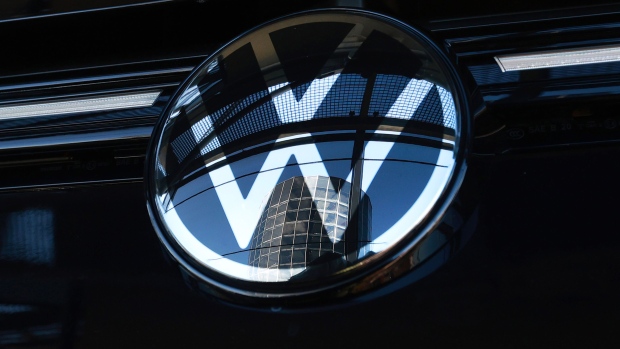Mar 14, 2023
VW Swings €180 Billion Spending Plan to Further New Technology
, Bloomberg News

(Bloomberg) -- Volkswagen AG is increasing investments in software and EVs to close the gap to Tesla Inc. and halt a decline in China just as the threat of a demand slowdown hangs over the automotive market.
The German carmaker is boosting its rolling five-year spending plan by 13% to €180 billion ($193 billion) with more than two-thirds going to software and electric vehicles. VW said turning around sliding market share in China is a “major challenge.”
“We want to translate our strength in internal combustion engines in China to e-mobility,” Chief Executive Officer Oliver Blume told reporters in Berlin during the carmaker’s annual press conference. This year “will be a decisive year for executing strategic goals and accelerating progress across the group,” he said in an earlier statement.
VW declined 2.6% at 12:50 p.m. in Frankfurt trading, outpacing losses in the STOXX Europe 600 Automobiles & Parts Index.
VW sold just under 40% of its vehicles in China last year, where its market share slipped to 15% from 19% in 2020. The drop is more pronounced among electric cars, where local manufacturers like BYD Co. and NIO Inc. offer attractive models at competitive prices. EV sales in China are expected to reach 50% by mid-decade, adding urgency to accelerate VW’s offerings, Blume said.
Investors are keen for Blume, who took over in September, to reveal more about his strategic priorities after focusing on fixing the company’s chaotic software push and scrutinizing costly projects. The company is planning to hold an investor day in June, where it’ll detail results of preparations on theoretical initial public offerings for select business units.
Blume kicked off the IPO dry runs following last year’s blockbuster Porsche AG share sale, and has since emphasized that only its PowerCo battery business was a candidate to go ahead for a listing. Still, the CEO on Monday said he would not rule out a share sale for Lamborghini or other units.
The investment update raises spending on new technology to €122 billion, up from €89 billion during the plan’s last update in 2021.
The “substantial” growth in investments “will present a key worry for investors” concerned about drag on cash flow, Bernstein analyst Daniel Roeska said in a note.
The spending spree also extends to North America, where VW on Monday announced plans to build a battery plant in Canada, its first outside Europe. The company seeks to fast-track an expansion in the US to lessen its dependence on China and earlier this month also detailed plans to for a new $2 billion EV plant in South Carolina to make SUVs.
VW’s plans for batteries include building as many as six factories in Europe and securing raw materials to power EVs. The company’s PowerCo business is expected to generate sales of more than €20 billion by the end of the decade, VW said.
And while VW’s focus is on future technology, its combustion-engine investment will continue to rise before reaching a peak in 2025, it said, when tough new Euro-7 emissions regulation in the European Union come into force.
Increased Profit
Profit rose across all brand groups last year, including mass-market marques Skoda, Seat and VW, which eked out an operating profit gain to €4 billion in 2022, up from €3.5 billion the previous year, even as deliveries declined. Further gains will become more difficult as supply bottlenecks ease to boost vehicle output, Chief Financial Officer Arno Antlitz said in an interview with Bloomberg Television.
“We have to prepare for tougher competition, specifically in our volume plans,” Antlitz said. “We have to work on productivity, because we can’t pass on all this inflationary situation to the customer.”
VW earlier this month projected revenue to climb as much as 15% this year, with operating returns reaching as high as 8.5%, on full order books and better access to semiconductors.
--With assistance from Oliver Crook.
©2023 Bloomberg L.P.


